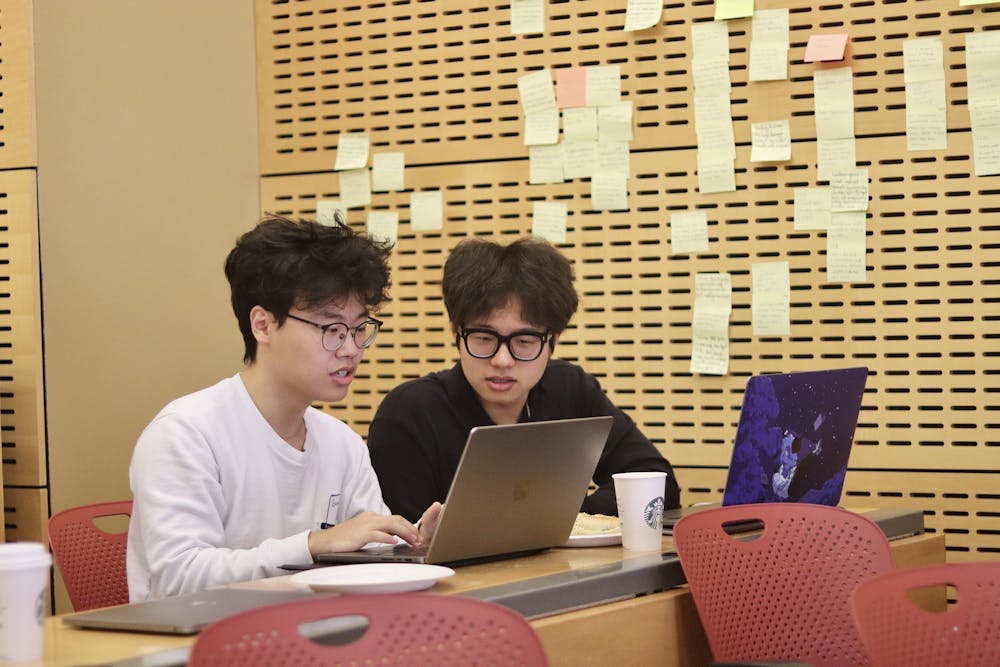Pockets of conversation filled Rice Hall Saturday morning as students kickstarted the Ideathon, an annual technology entrepreneurship event hosted by HooHacks. The Ideathon provides undergraduate and graduate students at the University with the opportunity to learn from business professionals, workshop their ideas and win up to $1,000 in funding for their startup pitch. Students across all schools and majors came together in a nine-hour workshop to cultivate their creativity and find out what it means to propose a project that aims to identify a societal need and provide solutions.
Students devoted their energy to discussing ideas, mapping out designs, talking with mentors and crafting compelling pitches. They also participated in a workshop on team building, led by Engineering Professor Derrick Stone. Their day culminated in a presentation to a board of judges, who decided whether each team would receive funding. Teams had free rein to build their ideas on any topic — the focus of this year’s groups ranged from medical literacy to pickup basketball.
Six out of fifteen teams were awarded funding this year. The winning projects range from an AI model that provides personalized fitness advice to an interactive interface that connects researchers to potential study participants.
William Mueller, co-president of HooHacks and fourth-year College student, said that the Ideathon motivates students to apply their knowledge to real-world problems they might see in the technology and software industries.
“You’re a full-time student, you have other things to worry about,” Mueller said. “But [in the Ideathon] you can take some time away to think about real-world problems and ways you can fix them. It’s a hopeful way to make the world a better place.”
The Ideathon appeals to business and technology-minded students alike, drawing in teams with a variety of academic interests. Fourth-year Commerce student Sarrah Abdulali worked with her team to pitch an app supporting beginners in pickup basketball culture, using court location and availability to connect people of various skill levels with each other. Abdulali said that working with students from different backgrounds and perspectives helped her team to generate fresh and creative ideas.
“[My group members] all brought a devil’s advocate perspective,” Abdulali said. “Whenever someone brought up an idea, it was always challenged, and I think that’s what’s allowed us to create such a good slide deck. We worked well together because we brought a fresh set of eyes to each issue.”
Many students drew inspiration for startups from their personal lives. Ankisha Singh, co-president of HooHacks and fourth-year College student, emphasized the importance of creating ideas based on firsthand experiences.
“That’s the first step in Ideathons — looking at what problems you face,” Singh said. “I hope that students [had] ideas and they [came] to this event to craft them into a professional pitch. I hope that people [were] able to get validation for their ideas and confidence through financial backing.”
Previous projects included technologies to improve transportation efficiency on school campuses, group students into carpools, and provide a system for organizing class schedules.
This year, through the new Patient Safety Technology Challenge, teams that addressed healthcare-related issues had the chance to win an additional $500 in funding. The money was granted by the Pittsburgh Regional Health Initiative, a nonprofit that supports student-led healthcare initiatives and improvements in safety and quality of healthcare. Besides providing additional seed funding, the PRHI also offered mentorship for students involved in the Ideathon’s healthcare track.
Singh and Mueller said that Patient Safety’s introduction into the Ideathon stems from efforts to address problems in healthcare following the COVID-19 pandemic.
“After COVID-19, there was a huge rise in medical errors,” Singh said. “A lot of systems in healthcare are very outdated. [Patient Safety] reached out to us and seemed like a great fit because they’re trying to look for new ideas, and that’s exactly what this event is all about.”
Additionally, Mueller noted how providing equitable healthcare for all is an essential consideration when developing technologies to address problems in the medical sphere.
“Since the pandemic, there have been disparities in health care between different minorities,” Mueller said. “One inspiration for Patient Safety is to get people to figure out how we can be equitable in providing healthcare, ensuring that these mistakes don’t happen.”
Dr. Justin Glasgow served as a mentor, judge, and representative of Patient Safety at the Ideathon. After presenting pressing problems in healthcare, Dr. Glasgow offered one-on-one mentorship and support to teams interested in the challenge. He said that the most common questions he received from students were about the feasibility of their projects.
“Students have been focused on understanding the healthcare space — the distinction between their concepts and reality — especially since a lot of college students don’t interact with the healthcare system besides once-a-year checkups,” Glasgow said.
Fourth-year Engineering student Ahyush Kaul’s team won funding in the healthcare track for their pitch. Their goal is to reduce response time to patients, providing Emergency Medical Services vehicles a safe and quick way to navigate to their destination by creating a technology that uses pre-existing traffic light infrastructure to map vehicles as they pass through intersections. Kaul said Dr. Glasgow’s mentorship provided valuable help on their project.
“[Dr. Glasgow] was really helpful in providing us with feedback, specifically with money, since our goal is to be a nonprofit,” Kaul said. “We don’t feel the need to charge EMS services for this technology, so we talked about how we can approach funding from public donors, private donors, and government funding.”
In the future, Singh and Mueller hope to continue forming relationships with more sponsors and spreading the word about the Ideathon. They envision, above all, that students continue to draw inspiration from each other.
“We just want [students] to think about ways they can make a difference,” Mueller said. “Hopefully, they realize that they can do more with their ideas than they thought coming in.”







